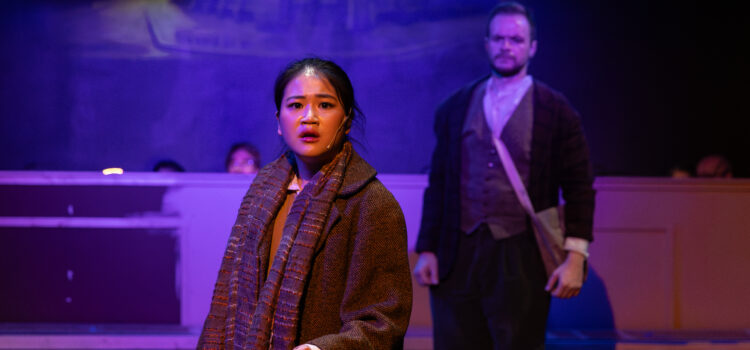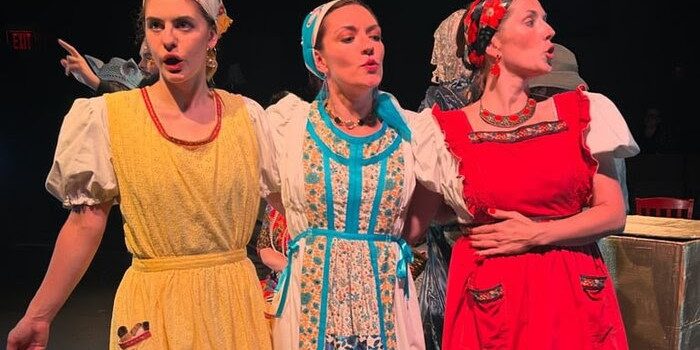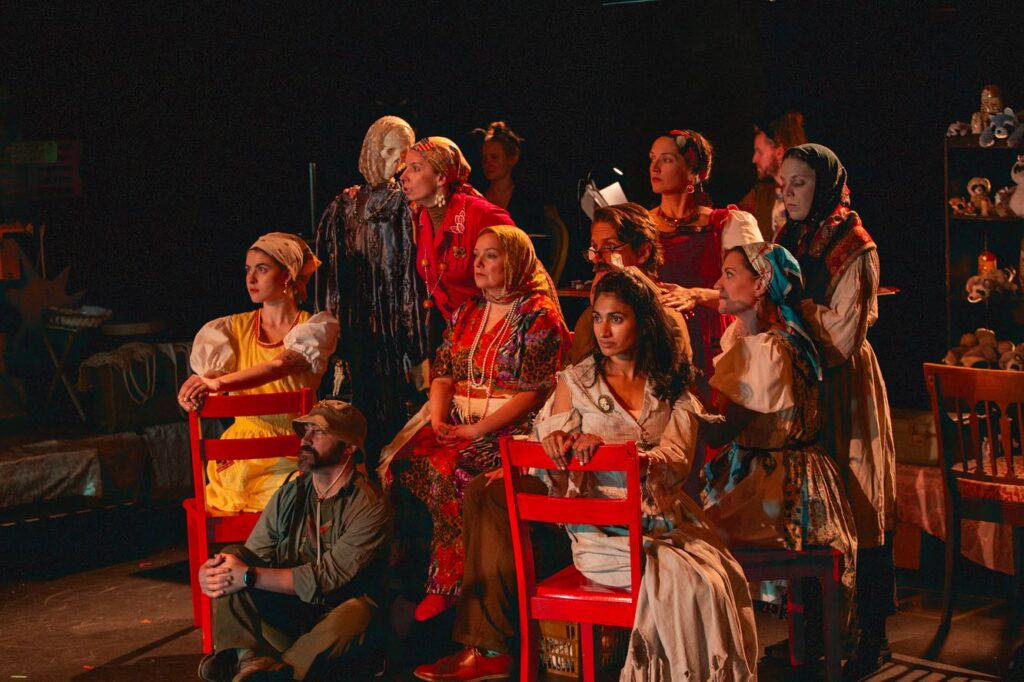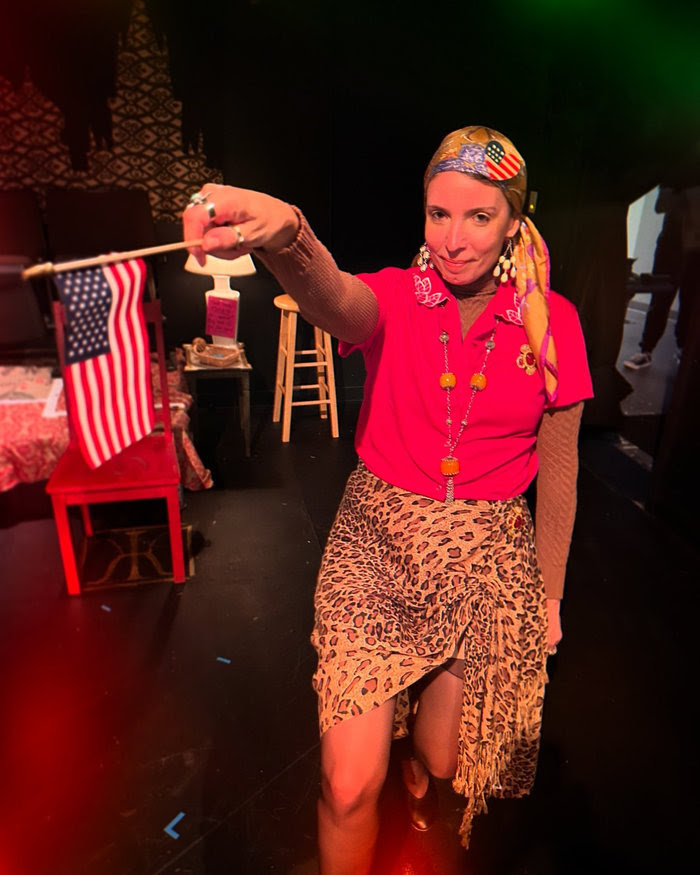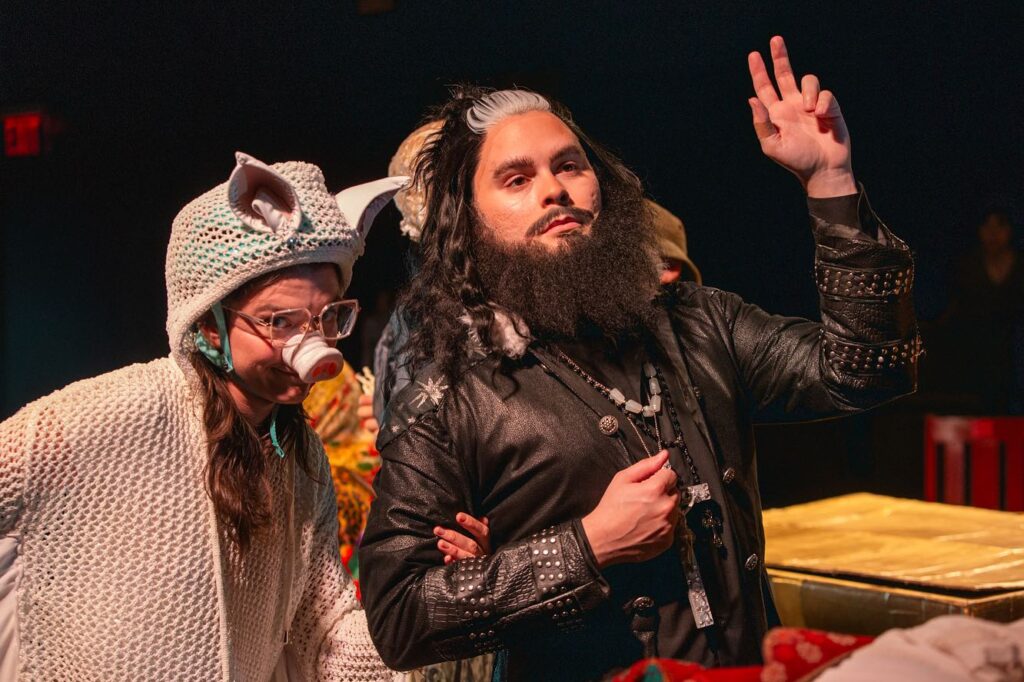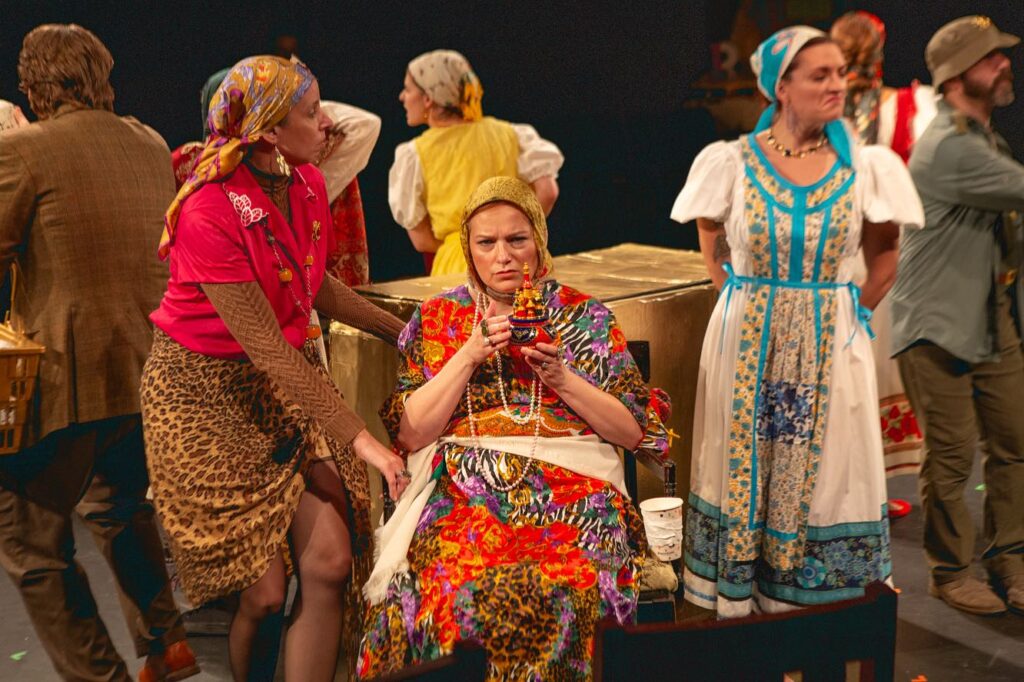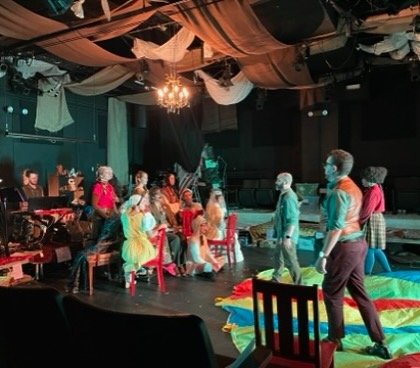By Lynn Venhaus
A zestful and exuberant “Anastasia: The Musical” is a crowning achievement for the Tesseract Theatre Company, which has crafted a big, bold production where every element is in harmony together.
Elegantly produced and seamlessly performed, this intriguing story centering on the legend of a Russian grand duchess is executed with remarkable skill by innovative creatives and a first-rate cast.
Impeccably staged as a swirling mix of constant motion, this adventurous blend of history, mystery and romance engaged from the jump. While this 2017 musical is not a flawlessly constructed show, the company’s determination and their lively interpretation propels it forward.
Using an abstract, intimate stage design at The Marcelle, director Brittanie Gunn, a Tesseract co-founder and creative director along with Kevin Corpuz, has focused sharply on the storytelling. The charming and well-cast 17-person ensemble’s hard work is obvious throughout this emotional journey that leads to a bittersweet finale.

This ultimately is a tale of self-discovery. Gunn wanted Anya to be seen as a strong woman, and Sarah Wilkinson is believable as she works on herself – who is she and who will she become? But other characters find their purpose and their way, too.
Tesseract has been dipping its toe into musical productions for the past two years, with small-scale shows “Ordinary Days” in November 2022, “The Last Five Years” in February 2023, and “The Mad Ones” in November 2023, with its first large-cast splashy musical “Kinky Boots” in August 2023. This year, an original musical “Cascade’s Fire,” and another small-scale effort “My Heart Says Go” were previously performed.
With the ambitious “Anastasia,” they are taking a huge leap forward, and each component is impressive — Gunn’s thoughtful depiction, Zach Neumann’s vigorous music direction, choreographer Michelle Sauer’s graceful ballet and vibrant period dance numbers, and the superb technical team’s designs.
This all-ages show, which has been performed by schools, youth and community theaters in recent years but not yet by regional professional companies, features lyrics by Lynn Ahrens and music by Stephen Flaherty, whose best-known works are “Ragtime” and “Seussical.”
This grand-scale musical is adapted from the well-liked 1997 animated movie, which in turn was inspired by the 1956 “what if” dramatic film “Anastasia” that starred Ingrid Bergman in her second of three Oscar-winning roles.
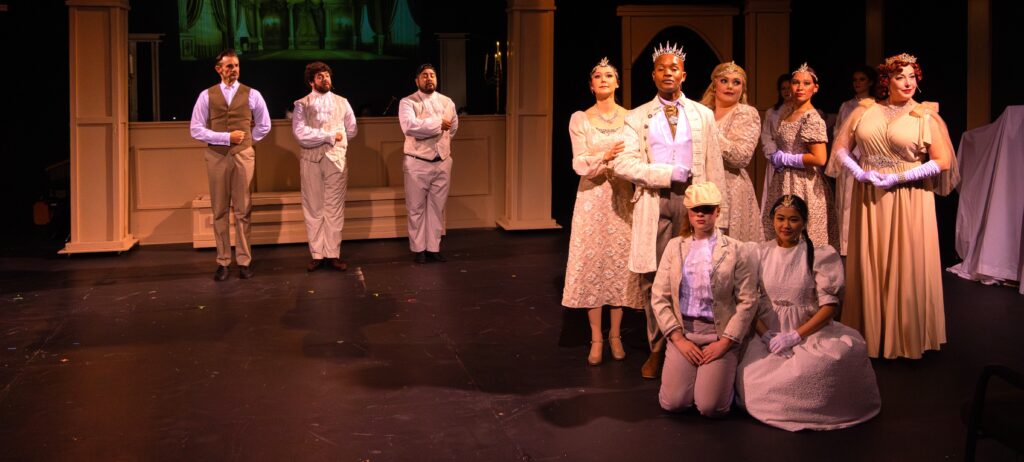
Fun fact: The animated musical’s music, composed by Ahrens and Flaherty, also featured music by David Newman, whose father, Alfred, was Oscar-nominated for the original 1956 film. This team earned two Oscar nominations for the film – musical score, and “Journey to the Past” for best song.
That power ballad is reprised in this stage musical, with a dynamic rendition by Sarah Wilkinson ending Act 1. There are five other songs from the movie, including the poignant “Once Upon a December,” and 16 new songs.
Playwright Terence McNally wrote the book, from the play by Marcelle Maurette, as adapted by Guy Bolton. While the late McNally is among the greatest, winning five Tony Awards, this result isn’t among his best. However, he shaped what could have been a too-sprawling complex narrative into several subplots that mesh well.
He has omitted the villain Rasputin and dropped the magic realism that were a major part of the animated tale, replacing the shady wizard with a formidable Bolshevik general Gleb, who seems as obsessed as Javert in “Les Miserables.” In fact, this show may remind you somewhat of “Les Miz,” only not as epic in scope.

The character Anastasia has always been enigmatic because she may or may not be who she thinks she is. The story arc begins at the twilight of the Russian Empire and moves to Paris in the 1920s, as this young woman tries to fit the puzzle together of her life.
The real story is that the royal family Czar Nicholas II, his wife, Alexandra; son, Alexis; and four daughters, Olga, Tatiana, Maria, and Anastasia, were taken captive after he abdicated the throne on March 15, 1917. They were executed by a firing squad of Communist Bolsheviks on July 17, 1918, along with four of their servants, but no bodies were immediately found. Reports were so unclear that the dowager empress, then in Crimea, doubted the news of her family’s death.
The musical begins nine years after the Russian Revolution in 1918. Legend has it that Anastasia escaped her family’s murder, but hit her head while running away, causing her to lose all her memories.
Can she reclaim the magic of her childhood? In an interesting contrast, the show flashes back to Anya as a child, and 12-year-old Devynn Phoenix is luminous in her dance sequences as both the young Anastasia and Alexia. Ella Drake demonstrates superb dancing skills in ballet sequences, also.

As the grown-up Anya, she meets two conmen, Dmitry and Vlad, who are looking for a girl to pretend she is the lost princess. Wilkinson easily slips into Anya’s skin, while new-to-professional theatre Aaron Fischer is revelatory as Dmitry, and Kent Coffel, an MVP when it comes to playing comedic sidekicks, works well with both.
The men hatch their imposter plan in “A Rumor in St. Petersburg.” They tutor her, a la “My Fair Lady,” in “Learn to Do It,” then take her to Paris and plan to meet with her grandmother, because they think the Dowager Empress will give them a substantial reward for recovering this long-lost member of the royal family.
Through this process, she slowly starts to regain her memory and believes she is indeed the real Anastasia. Wilkinson’s transformation is palpable, and you see her become more radiant.
Wilkinson, who has been memorable on local stages in “Nine” and “Into the Woods,” is an accomplished singer and dancer. With an opportunity to anchor this production, she grabs it with gusto.
She shines on her solo numbers. “Once Upon a December” is wistfully delivered, as is “A Secret She Kept,” and “In My Dreams” is a touching tribute to starting over. She also possesses considerable poise and carries herself regally on stage.

Act 2 opens with an ebullient “Paris Holds the Key (to Your Heart)” and the chorus also has fun with “Land of Yesterday” led by the intrepid Kimmie Kidd-Booker as the lady-in-waiting Countess Lily.
Anya and Dimitry are in a budding romance that’s straight out of a Hallmark movie template, but Wilkinson and Fischer have a genuine connection. He soars in his strong vocals, especially “Everything to Win” and with Anya in “My Petersburg” and “In a Crowd of Thousands.”
Vlad reminisces about hobnobbing with the aristocracy, and his wit comes through – as does his physical comedy.
In his role as Gleb, Donald Kidd stuns with his sturdy vocals and layered characterization. “The Neva Flows,” along with Anya, showcases his vocal command, and when he realizes he has feelings for Anya, “Still.”
As the Dowager Empress, dauntless Margery A. Handy is imposing, and has a terrific song, “Close the Door.” She is as stately as Lily is goofy. Kidd-Booker is hilarious hamming it up as Vlad’s former mistress, and she and Coffel know how to create an effective chemistry in “The Countess and the Common Man,” ramping up the physical comedy.
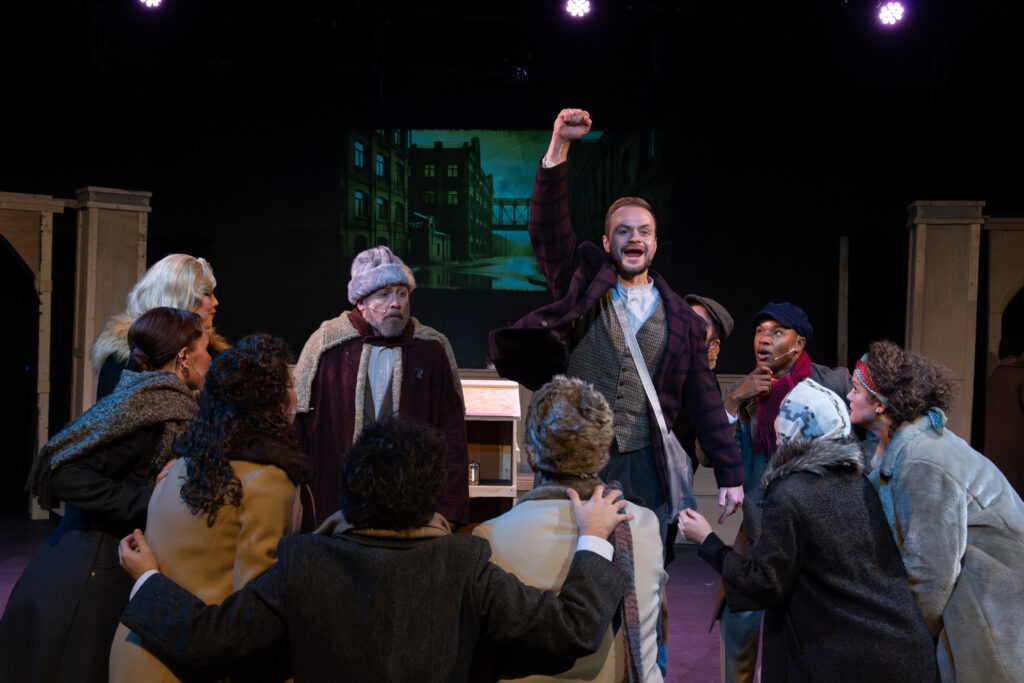
The ensemble is quite strong, with distinctive characterizations developed by each supporting player. Tielere Cheatem, Scott Degitz-Fries, Ella Drake, Danielle Feinstein, Julia Gilbert Gaglio, Lindsey Grojean, Jaelyn Hawkins, Stephanie Merritt, Jacob Schmidt and Kelvin Urday all blend well, but also stand out as different characters.
They harmonize beautifully, and the orchestra’s vitality is noticeable. Besides conducting, Neumann is on keyboards, joining Chuck Evans on violin, John Gerdes on brass, Lea Gerdes and Joseph Hendricks on reeds, Brad Martin on percussion, and Paul Rueschhoff on cello.
The musical’s costumes are an opulent showcase, with costume designer Sarah Gene Dowling assembling a bevy of beautiful gowns, flashy vintage party dresses, textured ethereal whites, working-class garments and heavy wintry outerwear. She collected over 100 looks for this show alone.
The craftsmen meet the moment, with noteworthy sound design by Phillip Evans, lighting design by Kevin Bowman, properties design by Rachel Puleo, and scenic design by Todd Schaefer.
Kevin “Kevlar” Sallwasser was the technical director, Sarah Baucom production manager, and Marisa Daddazio the stage manager, with Bella Lucero assistant stage manager and Hannah Lohmeyer the intimacy coordinator.
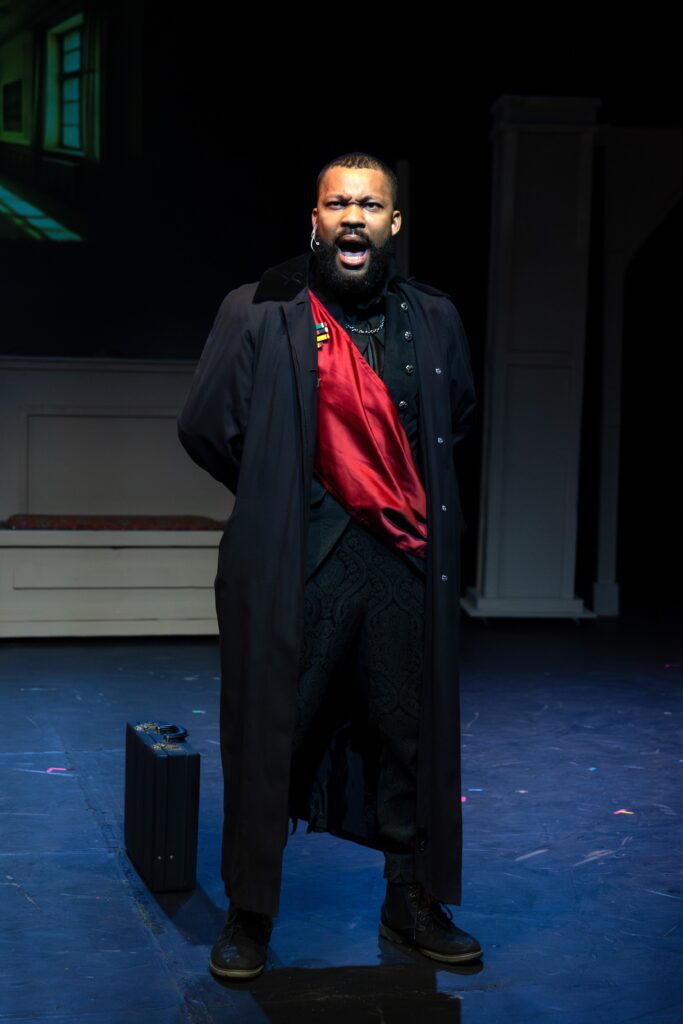
The show’s lush qualities combine with the venue’s cozy ambience to create an enchanting experience. “Anastasia: The Musical” will linger for a while. Tesseract’s mission accomplished, and it was refreshing to see how well it all came together.
Tesseract Theatre presents the musical Anastasia Thursdays through Saturdays at 8 p.m. and Sundays at 4 p.m., Nov. 14 – 24. Performances take place at the Marcelle Theatre in Grand Center. For more information: www.tesseracttheatre.com.

Lynn (Zipfel) Venhaus has had a continuous byline in St. Louis metro region publications since 1978. She writes features and news for Belleville News-Democrat and contributes to St. Louis magazine and other publications.
She is a Rotten Tomatoes-approved film critic, currently reviews films for Webster-Kirkwood Times and KTRS Radio, covers entertainment for PopLifeSTL.com and co-hosts podcast PopLifeSTL.com…Presents.
She is a member of Critics Choice Association, where she serves on the women’s and marketing committees; Alliance of Women Film Journalists; and on the board of the St. Louis Film Critics Association. She is a founding and board member of the St. Louis Theater Circle.
She is retired from teaching journalism/media as an adjunct college instructor.

